The Mayo Clinic is focused on extending the healthspan. “Worldwide demographics place life expectancy at 73, but the average age of chronic disease onset is 64. That gap between health span and life spans could be closed with proper public policy initiatives and application of new regenerative and anti-#senescence discoveries to clinical care. Breakthroughs that extend life expectancy could potentially be matched with more years of good health. Mayo researchers contend that new solutions for increasing healthspan lie at the intersection of #regenerativemedicine research, anti-senescent investigation, clinical care and societal supports. A regenerative approach offers hope of extending the #longevity of good health, so a person’s final years can be lived to the fullest.” My comment: major research institutions are increasingly devoting resources to advance #geroscience. This is no longer the realm of science fiction but science fact! #healthspan
By Susan Buckles – Mayo Clinic
Regenerative medicine could slow the clock on degenerative diseases that often ravage the golden years, a Mayo Clinic study finds. Life span has nearly doubled since the 1950s, but health span — the number of disease-free years — has not kept pace. According to a paper published in NPJ Regenerative Medicine., people are generally living longer, but the last decade of life is often racked with chronic, age-related diseases that diminish quality of life. These final years come with a great cost burden to society.
Researchers contend that new solutions for increasing health span lie at the intersection of regenerative medicine research, anti-senescent investigation, clinical care and societal supports. A regenerative approach offers hope of extending the longevity of good health, so a person’s final years can be lived to the fullest.




